Eating tofu or other soy products is good for weight loss, as they reduce appetite and insulin resistance, increase metabolism, and preserves lean mass!
How many Calories?
Soybeans as well as most soy products are high in calories. Actually, soybeans are the most calorie-dense beans. Other common beans have fewer calories. Boiled soybeans have 172 calories per 100g. A serving has 296 calories. Soybeans are rich in fat with almost 9 grams of fat per 100g or 15.4 grams per serving! So, we should consume soybeans and other soy foods in moderation.[1]
Soy milk has only 41 calories per 100 mL. A glass of soy milk has about 103 calories. A glass of soy milk has 7 grams of protein and 4.9 grams of fat.
Soy sauce is another common soy product. However, soy sauce is pretty low in calories with only 60 calories per 100g or 11 calories per tbsp. Soy sauce comes from protein! Soy sauce has 1.9 g of protein per tbsp!
Most common soy products are also high in calories:
- Tofu has 270 calories per 100g or 230 calories per serving.
- tempeh has 195 calories per 100g or 165 calories per serving.
- edamame has 121 calories per 100g or 188 calories per serving.
- soy flour has 452 calories per 100g. For comparison, whole-wheat flour has 370 calories per 100g. Soy flour is particularly high in protein (39 g per 100g) as well as fat (21 g per 100g).
- miso soup has 33 calories per 100g. A cup has only 79 calories.
- soy protein isolate has 335 calories per 100g. A scoop has about 95 calories.
Soy is filling
Above all, tofu consumption can help us lose weight because soybeans have a huge filling effect. They’re packed with protein and fiber. These two macronutrients control appetite and prevent cravings for fattening foods. Despite, the fact that soybeans are the most calorie-dense beans, they can help us consume fewer total calories in a day.[2]
According to many studies, soy fiber can help lose weight, reduce body fat, and improve body composition in overweight people. Also, it may reduce LDL cholesterol.[3]
Soybeans are excellent dietary sources of fiber. They contain 6 grams of fiber per 100g. A serving (1 cup) provides 10.3 grams of fiber. This amount is about 37% of the recommended daily intake! Consuming beans is the easiest way to boost your daily fiber intake. All beans are particularly rich in fiber.
Most soy products are also great sources of fiber:
| fiber (g) per 100g | fiber (g) per serving | % DV | |
|---|---|---|---|
| soy flour | 18 | 15.3 | 55% |
| soybeans | 6 | 10.3 | 37% |
| edamame | 5.2 | 8.1 | 29% |
| tempeh | 9.5 | 8 | 29% |
| tofu | 3.9 | 3.3 | 12% |
| soy milk | 0.5 | 1.25 | 4% |
| miso | 5.4 | 0.92 | 3% |
| soy sauce | 0.8 | 0 | 0% |
| soy protein | 0 | 0 | 0% |
Dietary fiber is classified into soluble and insoluble fiber. Soybeans contain both. Soybeans consist mainly of insoluble fiber. Actually, about 89% of the total fiber in soybeans is insoluble fiber. Only 11% is soluble fiber.[3]
Insoluble fiber doesn’t dissolve in water. It absorbs water, making the stool softer, helping defecation. On the other hand, soluble fiber dissolves in water, turning to a gel. It slows down digestion and has satiating effects. Thus, it supports weight loss.
Soy Protein helps Lose Weight
Soybeans are mainly protein. They have 18.2 g of protein per 100g.
Soy protein has beneficial effects on obesity. Not only it affects satiety, but also it can reduce excess body fat in obese people.
Soy protein improves insulin resistance, which is a key risk factor for obesity.
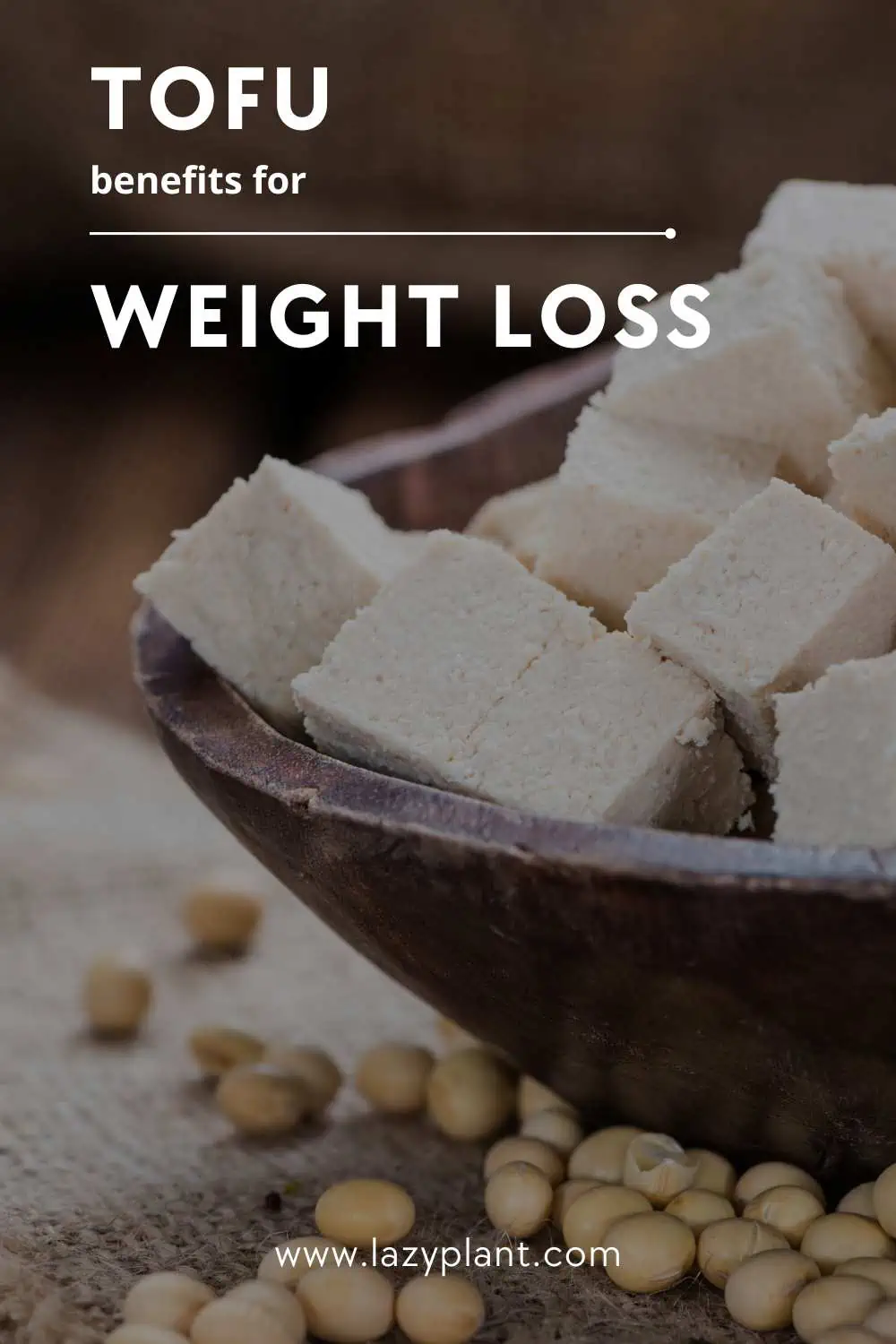
In addition, soy protein reduces plasma cholesterol, triglycerides, and fat accumulation in the liver and adipose tissue. Hence, soy protein may reduce the risk of atherosclerosis and possibly other obesity-related complications.[3]
Soy milk contains approximately 7 grams of protein per glass, while a serving of cooked soybeans contains 31 grams of protein!
Fried tofu contains almost 19 grams of protein per 100g!
Moreover, soy milk has fewer calories than cow’s milk.
Tofu & other Soy Foods may Increase Metabolism
Moreover, soybeans and the most common soy products, like tofu, edamame, and tempeh, can help us lose weight because they appear to boost metabolism.[4]
Soy protein could affect the synthesis of certain hormones, which control satiety, brain signaling, and metabolism. Also, soy protein can interact with certain receptors in the brain.
Some people are resistant to these hormones. Hence, they always feel hungry. Eating foods that manage these hormones could help people stick to a long-term energy-restricted diet plan for weight loss.
Eat Tofu for a Lean Body
Furthermore, soy protein is a complete protein. It contains all essential amino acids. It has a biological value closely to animal protein. Certainly, soybeans are among the best plant-based sources of protein.
Our bodies need all essential amino acids to build or even preserve muscle mass.
When we follow a hypocaloric diet for weight loss, we don’t lose just fat. We lose muscle mass as well. Resistance training and consumption of high-quality protein are key for minimizing the loss of muscle mass.
Increased muscle mass means better metabolism.
Even replacing animal protein with soy protein could help people lose weight. According to a study, replacing just 30 grams of animal protein with soy protein a day for 12 months, helped people lose weight and improve Body Mass index.[5]
You can find a wide variety of soy protein isolates on iHerb.
Also, the consumption of whole soy foods reduced the cardiovascular risk in volunteers.
Prefer consuming whole soy foods, like edamame, tempeh, or tofu, rather than highly processed soy products in order to take advantage of their health benefits. Whole soy foods are packed with fiber and certain micronutrients that are lacking in refined foods or animal-derived protein.
Soy Isoflavones for Weight Loss & good Health
Actually, soybeans are the richest food in isoflavones. Isoflavones are polyphenolic compounds with many health benefits.
Soy isoflavones could be beneficial for body weight reduction. They can control glucose, and insulin levels. Also, isoflavones may reduce Body Mass Index.[6,7]
In fact, isoflavones have many health benefits. They can help maintain blood vessel health, help support cellular health, reduce inflammations, and significantly increase the antioxidant status of the body! Soy isoflavones may reduce the risk of cardiovascular heart disease, cancer, menopausal symptoms, and osteoporosis.[8,9]
Moreover, if consumed instead of animal protein, soy products may reduce LDL cholesterol and triglycerides. Fermented soy foods may have a beneficial effect on diabetes and blood pressure as well. In addition, soy foods may alleviate hot flashes and improve skin health.[10]
Isoflavones are plant-derived compounds with estrogenic activity. They’re classified as phytoestrogens. Due to their high content of these phytoestrogens, many people think that soy foods are bad for our health. Tofu and other soy foods aren’t bad for you, though. Many studies support the safety and health benefits of soy foods.
Vitamins & Minerals in Soy promote Weight Loss
Soybeans are super nutrient-dense foods. They’re packed with minerals that support weight loss.
Iron
Soybeans are excellent dietary sources of iron. The regular consumption of soybeans as well as other soy products can improve the iron status of iron-deficient people.[4]
Actually, they’re the richest beans in iron, containing 5.14 mg of iron per 100g. A serving of cooked soybeans contains 8.84 mg of iron or 49% of the recommended daily intake.[5]
Iron is a key component of hemoglobin; a protein of red blood cells that transfers oxygen from the lungs to the tissues.
Also, iron is essential for muscle metabolism, healthy connective tissue, energy metabolism, cellular functioning, physical growth, neurological development, and the synthesis of some hormones, amino acids, and collagen.[1,2]
Iron deficiency is the most common nutritional deficiency worldwide, though! It may lead to serious side effects, such as gastrointestinal disturbances, impaired cognition, weakened immune function, fatigue, and low body temperature. Moreover, iron deficiency during pregnancy may increase the risk of premature delivery, and miscarriage.[3]
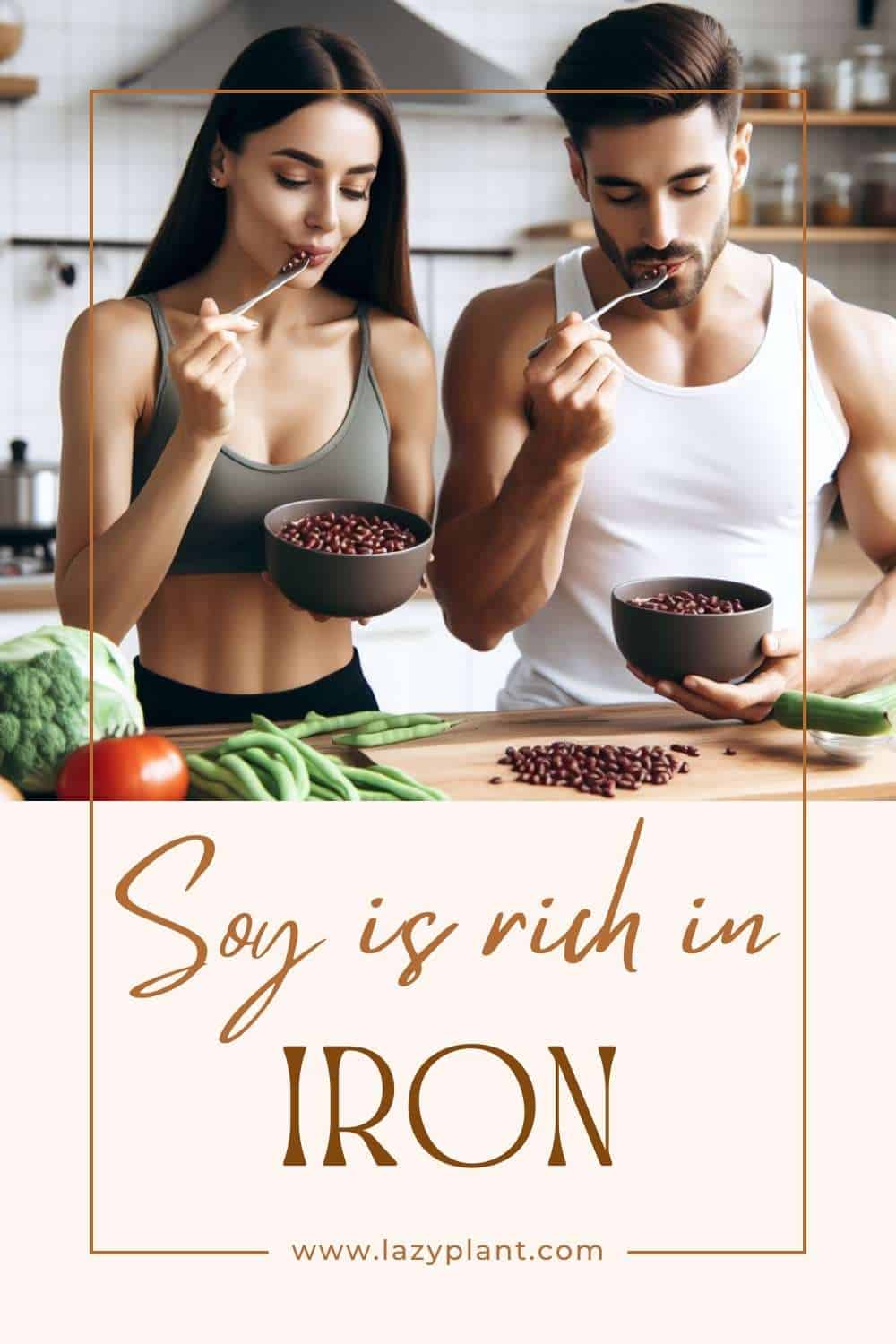
Soy milk can help us meet our daily iron needs as well. It naturally contains approximately 0.37 mg of iron per 100g. Most soy milks provide about 6% of the DV (Daily Value) per serving.
| iron (mg) per 100g | iron (mg) per serving | % DV | |
|---|---|---|---|
| soybeans | 5.1 | 8.8 | 49% |
| soy flour | 9.5 | 8 | 45% |
| tofu | 4.9 | 4.2 | 23% |
| soy protein isolate | 14.5 | 4.1 | 23% |
| edamame | 2.3 | 3.5 | 19% |
| tempeh | 2.1 | 1.8 | 10% |
| soy milk | 0.37 | 0.93 | 5% |
| miso soup | 0.33 | 0.79 | 4% |
| soy sauce | 2.38 | 0.14 | 1% |
We only absorb between 5% and 12% of nonheme iron (iron in plants). However, iron-deficient people can absorb much higher doses of iron from food. People with low levels of iron can absorb up to 27% of iron from soy products.[6]
Calcium
All beans are great dietary sources of calcium. Soybeans are the richest beans in calcium, though. Cooked soybeans contain 102 mg of calcium per 100g while a serving provides 18% of the recommended daily intake.[3]
All soy foods are particularly rich in calcium. For instance, a glass of soy milk may contain more calcium than a glass of cow’s milk!
Fried tofu contains 372 mg of calcium per 100g! This is 37% of the DV.
Getting adequate amounts of calcium may be beneficial for weight maintenance as well as weight loss.[12]
Calcium may prevent hunger and reduce insulin resistance. It can help people stick to a long-term calorie-restrictive diet. Moreover, high calcium intake can improve body composition. Calcium helps maintain lean body mass.[13,14]
People who consume fewer calories in order to lose weight need more calcium. If these elevated calcium requirements are not met, the bone mass may be reduced, increasing the risk of fractures.[15]
However, most people shouldn’t get extremely high doses of calcium from supplements. We can get more than enough calcium from foods, such as cow’s milk, dairy, eggs, and fish, as well as plenty of plant-based foods.
| calcium (mg) per 100g | calcium (mg) per serving | % RDI | |
|---|---|---|---|
| soy milk | 155 | 388 | 39% |
| tofu | 372 | 316 | 32% |
| soy flour | 258 | 219 | 22% |
| soybeans | 102 | 175 | 18% |
| edamame | 63 | 98 | 10% |
| tempeh | 96 | 81 | 8% |
| soy protein isolate | 178 | 51 | 5% |
| miso soup | 16 | 38 | 4% |
| soy sauce | 20 | 1.2 | 0% |
Do we absorb calcium from soy milk or other soy products?
Although soybeans are excellent dietary sources of calcium, we absorb only a small percentage of their calcium content. They contain substances such as oxalic acid, polyphenols, and phytic acid, which inhibit calcium absorption. These compounds bind to calcium, forming indigestible salts. So, we absorb about 5% of the calcium of soybeans.[5,6]
Other foods high in compounds that inhibit calcium absorption are spinach, collard greens, sweet potatoes, and rhubarb. Avoid consuming them with foods high in calcium.
On the other hand, we absorb much more calcium from cow’s milk, dairy, or fortified foods. The calcium absorption of these foods is about 30%.
Certainly, if you follow a well-balanced diet, you shouldn’t worry about calcium consumption. The interaction of oxalic or phytic acid with calcium doesn’t significantly affect total calcium intake. The best way to boost calcium intake is to eat plenty of foods high in calcium.
Magnesium
Furthermore, soybeans are excellent dietary sources of magnesium:
- a serving of soybeans contains 148 mg of magnesium, or 35% of the Daily Value.
- a glass of soy milk contains 44 mg of magnesium, or 10% of the DV.
- fried tofu contains 60 mg of magnesium per 100g, or 14% of the DV.
High magnesium intake is beneficial for obese individuals or people with insulin resistance. Magnesium can help them lose weight, reduce waist circumference, and Body Mass Index.[16,17]
Obese people and people with diabetes tend to have low levels of magnesium. Magnesium deficiency may lead to many health problems, such as hypertension, cardiovascular, and metabolic disease.[18,19]
Zinc
In addition, soybeans are pretty rich in zinc. A serving of cooked soybeans contains almost 2 mg of zinc, which is 18% of the DV. Moreover, a glass of soy milk provides 6% of the DV, while a serving of tofu provides 15% of the DV.
High zinc intake might increase the effects of a restricted calorie diet on obesity. Zinc may reduce appetite, insulin resistance, inflammations, and other metabolic dysfunction associated with obesity.[20,21]
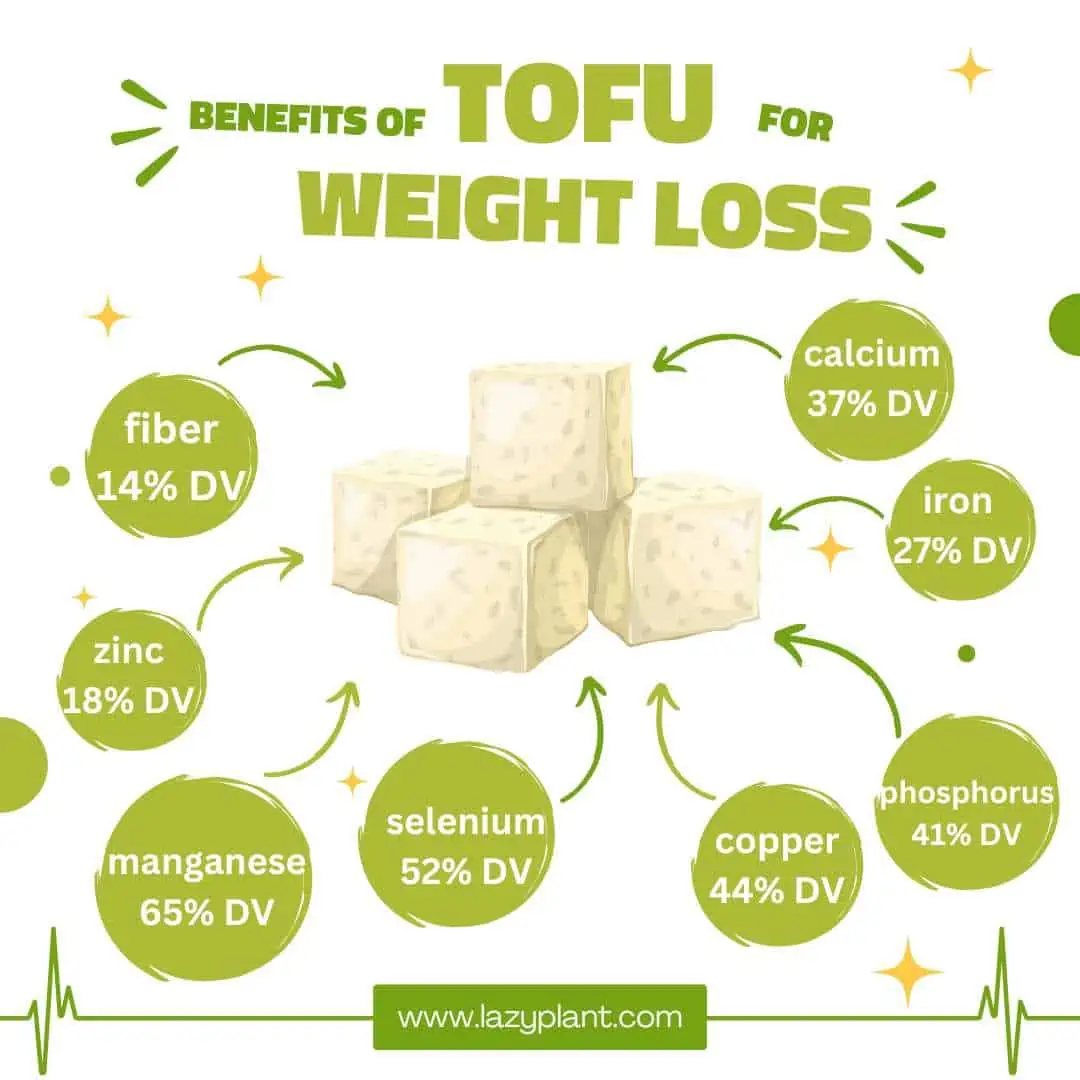
Potassium
Moreover, soy foods are particularly rich in potassium. A serving of cooked soybeans contains 886 mg of potassium, or 26% DV. A glass of soy milk provides 9% DV, and a serving of tofu provides 4% DV.
A diet high in potassium promotes weight loss. It reduces waist circumference, Body Mass Index, inflammations, and insulin resistance!
Selenium
Also, soybeans are good dietary sources of selenium. A serving provides 23% DV. Selenium supports weight loss, as it’s involved in the synthesis of thyroid hormones, metabolism, and thermogenesis.
What’s the best time to consume Soy Weight Loss?
You can eat soybeans, or other soy foods, such as tofu, tempeh, edamame, or miso soup, at lunch or dinner.
After Exercise
Another great time to drink soy milk is after strenuous exercise. Protein in soy milk helps build muscle mass and promote recovery, while electrolytes in soy milk hydrate athletes better than water!
Every post-workout meal should be rich in protein. You could add soy milk or protein isolate to your post-workout smoothie.
Moreover, soy milk hydrates the body as it’s pretty rich in electrolytes. A glass of soy milk contains:
- calcium, 388 mg (38% DV)
- potassium, 295 mg (8.6% DV)
- magnesium, 44 mg (10% DV)
At Breakfast
Another great time to drink soy milk for weight loss is in the morning. As soy milk is an excellent dietary source of protein, it can keep us full for many hours with only a few calories!
A glass of soy milk contains about 7 grams of high-quality complete vegan protein! Foods rich in protein, fiber, and water have the highest satiating effect.
So, you should combine soy milk with fiber-rich foods like oats. Eating a bowl of oatmeal with soy milk at breakfast is particularly beneficial for weight loss. It’s one of the most filling breakfasts you can have!
Another great alternative for a super-filling breakfast is oats with Greek yogurt.
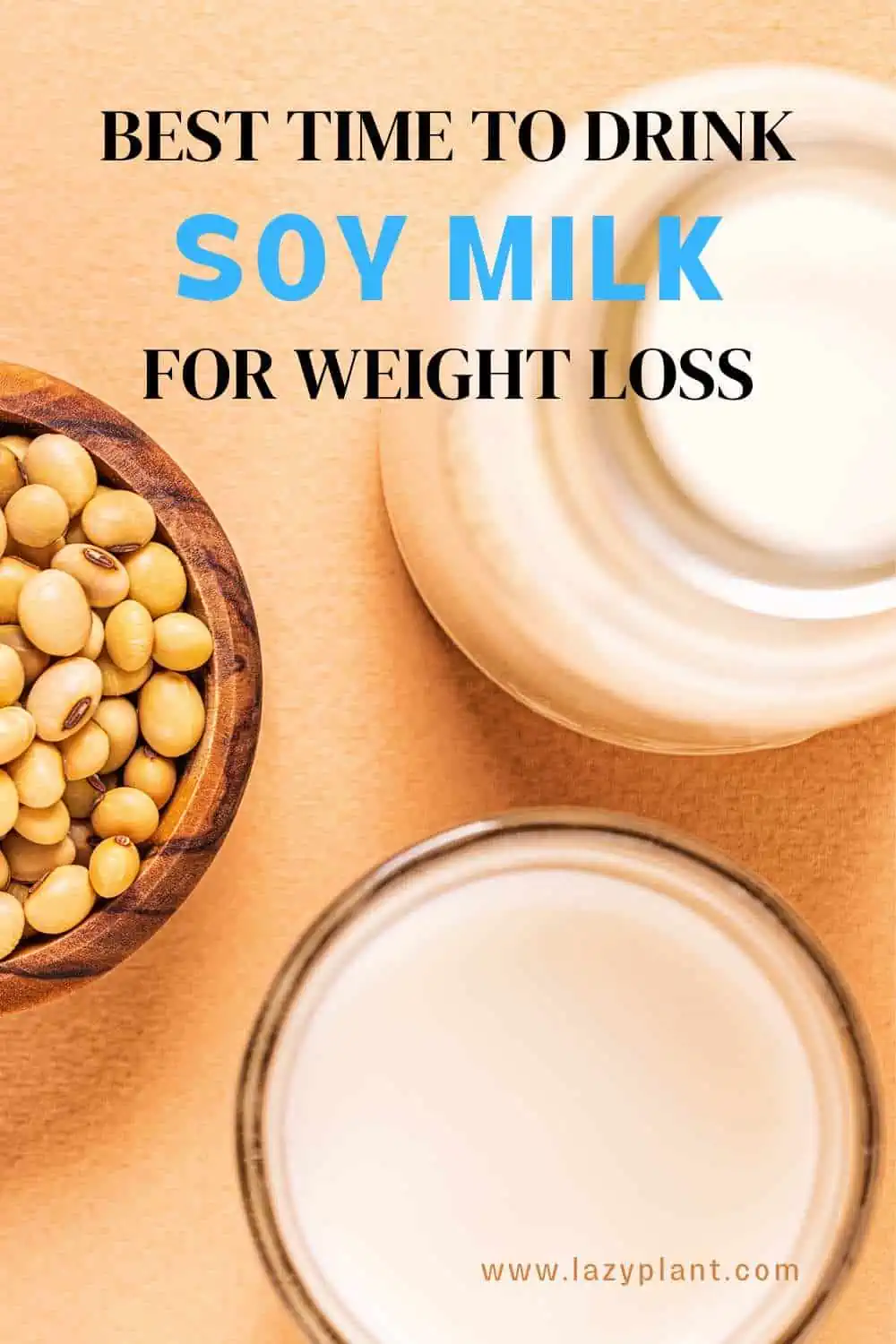
Before Bed
In addition, drinking a glass of soy milk before bed is good for you because soy milk is rich in compounds that can help us sleep better at night.
Magnesium in soy has a beneficial effect on sleep onset latency, early morning awakening, snoring, sleep duration, and daytime falling asleep.[2,3]
High iron intake may have beneficial effects on restless legs syndrome, general sleep disturbances, and sleep disordered breathing. Iron deficiency is associated with sleep-disorders.[4]
Potassium and calcium may improve sleep quality as well. Potassium, magnesium, and calcium are essential for improved sleep.[7,8,9]
Also, selenium deficiency may lead to insomnia and sleep difficulty.[10]
Vitamin B12 in fortified soy milk may improve sleep quality as well.[11]
In addition, soy isoflavones are positively associated with optimal sleep duration and quality.[15]
Furthermore, soy milk is pretty low in sugar. It contains fewer sugars than cow’s milk. Reducing sugar intake could be beneficial for a good night’s sleep.[17]
Vitamin B12 in Soy
Only fortified soy products may have a high vitamin B12 content. Soybeans and other soy products, such as soy milk, tofu, edamame, soy sauce, and soy flour naturally contain no vitamin B12 whatsoever.
The only soy product which naturally contains vitamin B12 is tempeh. Tempeh is a traditional, fungal fermented Indonesian product, usually made from soybeans.[4]
Vitamin B12 is synthesized only by certain bacteria, as well as microflora of animals. Certain microorganisms that are involved in the fermentation process of tempeh produce vitamin B12 as well.
The vitamin B12 content of tempeh is about 0.14 mcg per 100g. A serving of tempeh provides approximately 0.12 mcg of vitamin B12 which is about 5% of the recommended daily intake.
How to eat Tofu for Weight Loss?
Above all, you should avoid cooking tofu with any vegetable oil. All oils are packed with calories. They’re almost 100% fat. So, they’re extremely fattening foods.
Also, you should avoid adding too much salt. Among others, it can make you gain weight, as it retains water! Use spices or herbs to spice up your favorite tofu recipes.
Always combine tofu with fiber-rich foods like vegetables. Meals high in both fiber and protein provide the highest satiety effect.
Easy & Quick Tofu Recipes
Eating tofu as part of a healthy, filling, well-balanced diet is very easy. Here are 16 easy and quick tofu recipes that are ideal for weight loss and building a lean body!
8 Vegan recipes
Tofu Scramble: Sauté diced tofu with vegetables like bell peppers, onions, and spinach. Season with turmeric, garlic powder, and nutritional yeast for a delicious and protein-packed breakfast option.
Tofu Stir-Fry: Cut tofu into cubes and stir-fry with an assortment of colorful vegetables like broccoli, carrots, and snap peas. Add low-sodium soy sauce for flavor.
Tofu Veggie Wrap: Wrap sliced tofu, mixed greens, cucumber, and shredded carrots in a whole-grain tortilla. Drizzle with a light dressing made from lemon juice, Dijon mustard, and a touch of honey.
Tofu Salad: Cube tofu and combine it with mixed greens, cherry tomatoes, sliced radishes, and your choice of dressing. You can also add some avocado for healthy fats.
Tofu Bowl: Arrange cooked quinoa, roasted vegetables, and baked tofu in a bowl. Top with a drizzle of tahini or light peanut butter for added flavor.
Tofu Skewers: Marinate tofu cubes in a mixture of soy sauce, ginger, garlic, and a touch of maple syrup. Thread them onto skewers with bell peppers, onions, and mushrooms. Grill or bake until cooked.
Tofu Lettuce Wraps: Sauté crumbled tofu with minced garlic, ginger, and chopped water chestnuts. Season with low-sodium soy sauce. Spoon the mixture onto large lettuce leaves for a low-carb, flavorful meal.
Tofu Soup: Simmer tofu cubes in a vegetable broth with diced vegetables like zucchini, carrots, and mushrooms. Season with herbs and spices of your choice for a comforting and low-calorie soup.
8 protein-rich tofu recipes
Moreover, you could add turkey, chicken, red meat, shrimps, or egg for a protein-packed tofu recipes. Combine with fiber-rich vegetables for a supper filling food that can promote the feeling of fullness with a few calories for hours.
Tofu and Chicken Stir-Fry: Stir-fry sliced tofu and diced chicken breast with an assortment of colorful vegetables like bell peppers, broccoli, and carrots. Season with low-sodium soy sauce.
Tofu and Egg Scramble: Sauté diced tofu, cooked chicken breast, and scrambled eggs with vegetables like spinach, onions, and mushrooms. Season with herbs and spices of your choice.
Tofu and Shrimp Skewers: Marinate tofu cubes and shrimp in a mixture of soy sauce, garlic, and lemon juice. Thread them onto skewers with colorful bell peppers. Grill until cooked.
Tofu and Ground Turkey Lettuce Wraps: Sauté crumbled tofu and lean ground turkey with minced garlic, ginger, and chopped water chestnuts. Season with low-sodium soy sauce. Spoon the mixture onto large lettuce leaves for a low-carb and protein-packed meal.
Tofu and Chicken Salad: Combine cubed tofu, grilled chicken breast, mixed greens, cherry tomatoes, and sliced cucumbers in a salad bowl. Top with a light dressing of your choice. You can even use light mayo!
Tofu and Turkey Burger: Mix crumbled tofu and lean ground turkey with diced onions, garlic, and your favorite herbs and spices. Form into patties/ Grill or bake until cooked. Serve on a whole-grain bun or lettuce wrap.
Tofu and Egg Fried Rice: Sauté diced tofu, cooked chicken, and scrambled eggs with cooked brown rice, mixed vegetables, and a touch of low-sodium soy sauce for a flavorful and protein-rich fried rice.
Tofu and Beef Stir-Fry: Stir-fry sliced tofu and lean beef strips with a variety of colorful vegetables like broccoli, snap peas, and carrots. Season with a light soy sauce or stir-fry sauce.
Can tofu make you fat?
Certainly, tofu is one of the best vegan protein sources that’s ideal for weight loss. However, we should eat tofu and other soy products in moderation. They have a lot of calories. For instance, tofu has about 270 calories per 100g.
Soy milk has fewer calories than cow’s milk, though. It’s a great plant-based alternative!
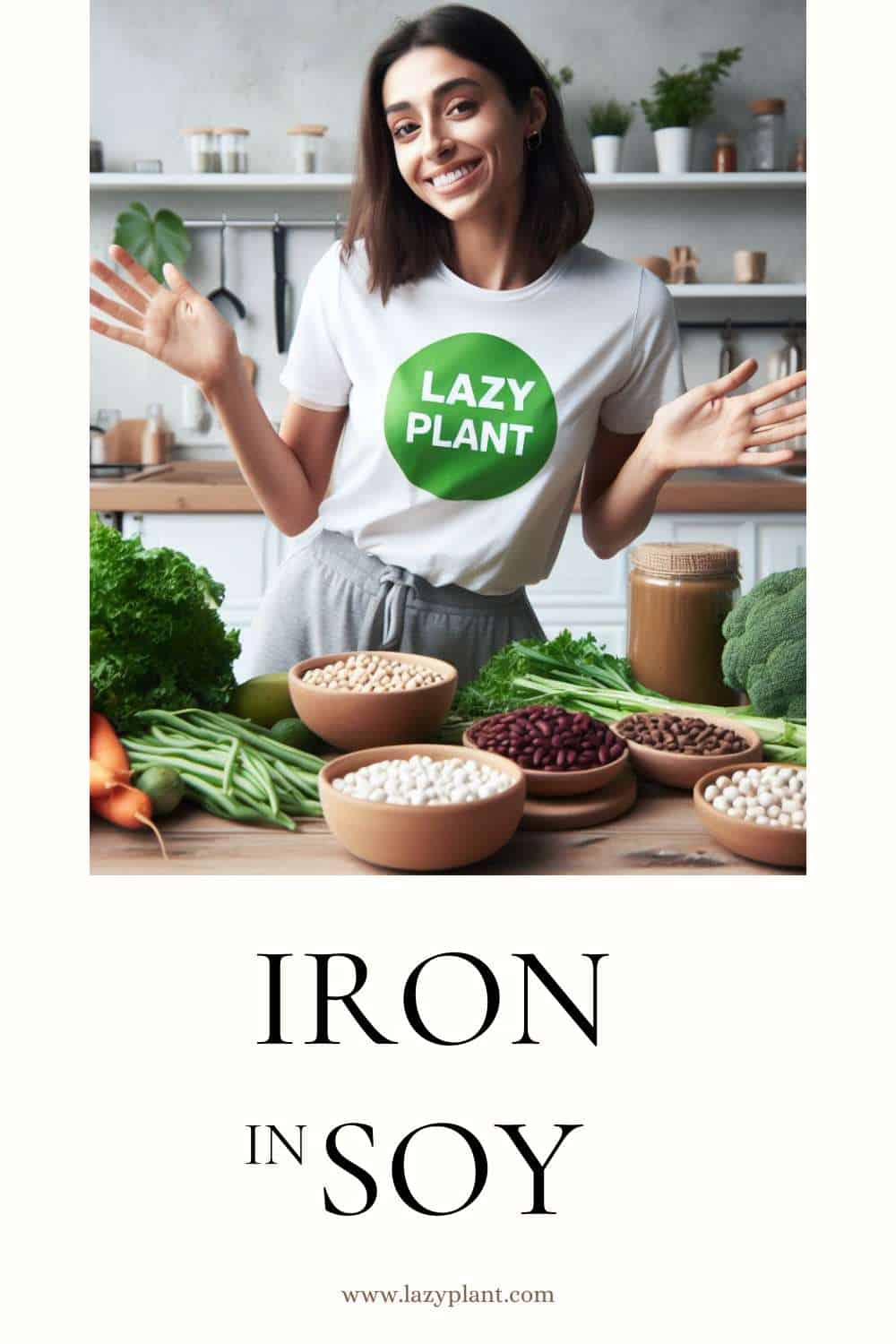
Soy or Cow’s Milk?
Soy milk can be a great plant-based alternative to cow’s milk. Soy milk may provide high amounts of calcium and vitamin B12, which are found abundant in cow’s milk. In addition, soy milk is rich in iron!
Furthermore, soy milk consists mainly of polyunsaturated fatty acids, which are beneficial for the heart when eaten in moderation.
On the other hand, cow’s milk is particularly high in saturated and trans fats. These types of fat are bad for you. We should avoid consuming them. The American Heart Association recommends consuming no more than 13 grams of saturated fat a day.[2]
A glass of 2% milk contains 2.7 grams of saturated fat (20% DV), while a glass of whole milk contains 4.6 grams of saturated fat (35% DV).
Moreover, cow’s milk has more calories. It has 122 and 152 calories per glass of skim and whole milk, respectively. Hence, cow’s milk has 20-49% more calories than soy milk!
We should consume cow’s milk and dairy in moderation.